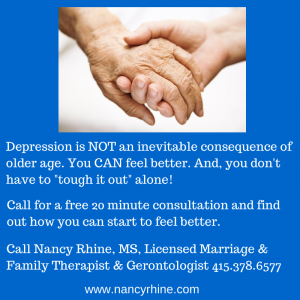gerontology
Why Gerontological Counseling for Older People & Their Families?
Why Does Gerontological Counseling Yield the Most Effective Healing?
If you or your loved one is a senior, the counselor you or she sees absolutely, in my opinion, needs to be up to date on the latest research involving aging.
Take, for example, the topic of brain neuroplasticity and neurogenesis. Why is it critical to know about this when counseling older people? Because, not even 10 years ago in graduate psychology programs around the country, interns were taught that brains decline from age 30 on! That things were was all “downhill” – brain cells wise – from there. The explosion of current, ground-breaking brain research that we’re seeing absolutely refutes this dire and incorrect belief. Not only is that attitude false, it is anti-healing!
Our brains are changing all the time. This is called neurogenesis. It happens until our very last breath. In order to support good brain health, we need to provide some basic tools such as good nutrition, limiting sugar and processed carbs, making sure we get plenty of daily exercise, not smoking, reducing environmental toxins, decreasing stress as much as possible, practicing good mental health habits/practices, staying involved socially with family and friends, making sure we take the appropriate supplements, vitamins and minerals, etc.
When I studied psychology as a graduate student, I learned about Eric and Joan Erikson’s famous Stages of Human Development. They had first published their theories and discoveries when they themselves were very young. As they grew older they realized what the research is showing now. That is, that the years from midlife to 90 years old and up are full of rich experiences, new discoveries, and constant evolution. As Eric and Joan moved through their 60’s, 70’s, 80’s and 90’s, they abashedly apologized for making ill informed assumptions that our brains basically stagnate after a certain age.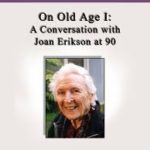
Now, I am not saying that our memories or that the way we think doesn’t change. We all experience what is called age-related cognitive change as we grow older. That is most often because we have so much more data in the “hard drives” of our brains! We can also suffer from ill health of various sorts, inflammatory conditions that affect our thinking, the side effects of medications that can impact us negatively, and depression and anxiety that can also cause foggy thinking. It’s important to approach conditions like these from a looking at the whole person approach to see what the underlying root problems may be.
The important thing to realize is that it is wrong to believe that older age inevitably leads to bleak depression and cognitive decline. Rather, we can and do grow into wisdom and the ability to cut through the chaff to the gist of what is needed to thrive. In fact, the root meaning of word wisdom, Joan Erikson wrote, is “to know how to”.
I’ll end by saying that too often I hear therapists say that they see anybody, that people are all the same. I think we may be similar but I know, without a doubt from my years of professional practice and my life experience, that the issues we face in older years are different and often far more complex, multi-layered and nuanced than when we are young. Plus, our American culture adds an often-harmful overlay of ageism to the mix.
Therapy with a gerontological counselor can help you get more quickly to the root of what is happening with you and/or your loved one and is up-to-date on other resources that can help you get the attention, care and healing support you need.
A New Year & A New Perspective
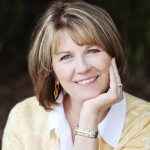 A New Year & A New Perspective
A New Year & A New Perspective
Dear friends and colleagues in the healing arts,
2015 presented me with some interesting challenges. After the death of my beloved mother and the near death and continued illness of my husband, I wondered how we healers can continue to serve our patients when we ourselves are in the midst of tough times. Maybe some of you have come up against this question too.
What I discovered is, as songwriter Leonard Cohen writes, “The birds they sang at the break of day. Start again I heard them say. Don’t dwell on what has passed away or what is yet to be. Ring the bells that still can ring. Forget your perfect offering. There is a crack in everything. That’s how the light gets in.”
It’s this last part that has surprised me. What an unexpected gift is the grace and light that can emerge out of adversity. What I am learned continually deepens both my work and my home life.
As we get older, we find ourselves adding to our toolkit of life skills. Mindfulness tools have reentered my life and work in a big way. And so has my intention to reach a much wider audience through teaching nationally about conscious aging. The need and demand for navigation help is so great as the boomer generation enters the unfamiliar terrain of older life.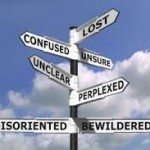
If you have friends, family or patients in these populations below who you think I might be able to help or if you have questions yourself, please feel free to reach out anytime:
- People in their 50’s, 60’s and 70’s waking up to their own sense of aging – often through illness or other changes in themselves or their loved ones. They seek answers, solutions, and guidance.
- Adult children of aging parents who feel confounded and frustrated about how to best help their parents through a myriad of difficult circumstances. They are the sandwich generation with aging parents, children and often grandchildren too.
- Families where adult children and aging parents need to and want to come to some new understandings and find a closeness now to the extent they can while they can still can.
- People in their 80’s and early 90’s who are facing their last years with all that that entails – memories, regrets, fears, peace and contemplation – all healthy parts of this stage of life. Having a genuinely caring nonjudgmental skilled listener is so valuable.
You might already know that there are very few psychotherapists in Marin who have advance training in gerontology. With my expertise in the fields of aging, communication, business, medicine and psychology, I am uniquely qualified to help your midlife and older patients, friends and family.
My offices are in Mill Valley and San Anselmo. Telephone appointments are also available for people who do not live close by. I provide a free initial phone consultation. And if I can’t help, I can often steer people to other beneficial resources.
With warm wishes for a peaceful 2016,
Nancy Rhine, MS, LMFT, CPG
415-378-6577
nrhine@gmail.com
Depression is NOT inevitable in older life.
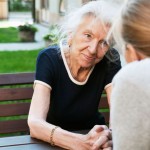 Our youth-oriented Western culture seems to tell us that we are all doomed to succumb to debilitating depression as an inevitable part of growing older. This is not true!
Our youth-oriented Western culture seems to tell us that we are all doomed to succumb to debilitating depression as an inevitable part of growing older. This is not true!
Sure, it is true that getting old “ain’t for sissies” as Bette  Davis famously put it. There are a myriad of challenges that confront us. Nobody would argue that! We know what those challenges are – all kinds of changes, losses of various sorts from little things to profound ones, aches and pains, the gamut.
Davis famously put it. There are a myriad of challenges that confront us. Nobody would argue that! We know what those challenges are – all kinds of changes, losses of various sorts from little things to profound ones, aches and pains, the gamut.
But, you can also thrive in later years. It’s about your mindset, your emotional and spiritual practices and your strong support network. The kids called support networks these days, their “posse”. Your posse can be made up of old and new friends, your peers, support group members, family, pets, counselors, trusted doctors and spiritual advisors.
Generally, people like you have an assortment of healthy, tried-and-true coping skills that have gotten you this far in your life. Perhaps now, however, you are encountering an accumulation of situations that tax those skills. It may be time to remember your old skills and to learn new ones. It may likely be time as well to rethink your life’s purpose. Purpose is key to keeping your mood up and your heart content.
What stands in the way? Well, too many times, that old Shame rears its head and tells you that you ought to be able to figure this out on your own, that you ought to be able to just “tough it out” and do it alone or else you’re weak. You can’t burden your children so what to do? As the blue box here says, don’t keep it bottled up inside!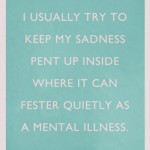
What people often don’t realize is that you are not alone in feeling challenged, stressed, confused, overwhelmed or anxious. These feelings surface when we are going through new phases and transitions in our lives. It’s during these times that it becomes so important to realize you don’t have to reinvent the wheel. There are many practices and tips for how to increase your enjoyment of life in older years.
The important thing is to not give up and figure that just depression goes with the territory. That may be what society tells you, it might be the prevailing attitude. But it is not true. Reach out for help. Counseling and support can turn your life around and help you reclaim your confidence, solid footing and peace of mind. Isn’t it worth a try? What have you got to lose!
Loneliness Leads to Serious Health Risks for Seniors
In findings published recently from a UCSF study, researchers were surprised to find that even people who don’t live alone can be very lonely.
Many of us who provide counseling for residents in retirement homes find this to be true. Individuals can be living surrounded by many other co-residents and still feel massively lonely.
This loneliness, the UCSF study found, can result in a significant 59 percent greater risk of physical decline. Even worse, the hazard risk for severe loneliness was found to lead to a 45 percent greater risk of death.
This points to the need for support for older adults in terms of understanding, empathy, attention, and genuine caring and engagement. Buddy systems for new residents of retirement communities is something often found to help introduce the new resident to potential new friends in their new homes.
Most importantly now, though, is for health professionals and caring communities to first realize the severe impact of loneliness on the physical, cognitive and emotional health of their beloved elders.
For more information, click here to read the entire article on the UCSF study:
Loneliness linked to serious health problems, death among elderly
Neighbors Helping Neighbors: Online Community for “Tweeniors” and Older Adults in Marin
Neighbors Helping Neighbors: Building an Online Information/Community Hub in Marin
Prior to my career as a Marriage & Family Therapist, and gerontologist, I was involved in starting and growing several online communities. I have seen the tremendous benefits to individuals of a well-organized online information hub focused on the needs and interests of a particular demographic or special interest group.
This type of Online Information Resource Center assembles links, reviews and articles in an easily searchable, Central Hub to provide ease-of-use and convenience to the target population. I think we need such a Hub in Marin.
A vibrant, free, online information hub focused on older adults, adult children of older parents, baby boomers, “tweeniors”, and sandwich generation-ers – focused on life in Marin – would link Marinites up to the rich range of excellent resources, services, service providers, products, agencies and activities we have right here in our own backyards.
Plus, we would be able to share with each other how we have solved the wide variety of challenges and successes that come with growing older in general and in our local communities. We participants could serve as a kind of living encyclopedia of help and answers and ideas. Which leads me to the topic of…
Social Media (Online Community) Building Friendships
What we now call social media and used to call online community is a central part of such a community and demographic-focused web site. Members will come, attracted to the information resources, and stay, becoming participants, because of the supportive and interesting community of others with similar concerns and interests. Support and bonds and connections and friendships grow.
There are many examples of successful online communities which offer wonderful stories of mutual support. Some of you may remember The WELL (Whole Earth ‘Lectronic Link) which started in Sausalito in the 1980’s as a pioneering and legendary online community affiliated with the Whole Earth Review magazine. The WELL is still thriving and some of its members have been friends online now for 25 years. Dupont Circle Village offers a thriving senior online community as part of its Village membership in the DC area.
Older Population Thriving & Online Too
We are the fastest aging county in California. The fastest growing part of our population is the 85+ age group. Older people are turning to social media tools in droves. Something like 18,000,000 U.S. Facebook users are 55 and older.
For those older people who are not online, some simple and gentle classes and instruction would introduce them to the potential benefits of learning how to access resources and friends/family. I believe it would be empowering for them to at least have the opportunity to make an informed choice about whether the tools are for them or not.
Help! How Do We Find Answers?
The main complaint I hear from older people and their adult children or other loved ones is that they have an extremely difficult time finding answers and help for the dilemmas they are facing. They don’t know where to turn and when they do find phone numbers, they encounter what feels like a land of endless voice mail.
Many older people end up going to the ER’s with problems that would have been easily preventable if they had had help, knowledge, answers and support earlier on.
Isolation is a Major Health Issue
In addition, isolation becomes a tremendous issue for our older people as they experience vision impairment or physical conditions that prevent them from driving. Their worlds start to shrink.
We are blessed to have Whistlestop Wheels in Marin but it is important to note that Whistlestop is ADA paratransit – thus it is not senior transit – it is disabled transit with a rigorous screening process.
Isolation affects so many quality of life issues for seniors – it can lead to loneliness and depression, decline in cognitive capability and even lead to poor nutrition if the individual has no easy access to groceries and little inspiration to eat well-balanced meals.
An Invaluable Tool in Communication Toolkits
Vibrant online communities can provide a bridge between homebound people, give answers to those who are looking for ideas and shared personal experiences, referrals and tips for places to go for help, and friendly connections that can grow into friendships.
Experienced managers train volunteer moderators in conversation and group facilitation and various writing and administration tools. Online policies are crafted, posted and enforced to prevent scam artists from taking hold. Webinars and a host of free online classes can be offered.
Neighbors Helping Neighbors: An Online Information/Community Hub
As our federal, state and county budgets decrease, and at the same time our population is aging (“the Silver Tsunami” we’ve all heard about), what will be our plans for taking care of ourselves as we grow older? Will we choose to “age in place” or, as its being referred to now, “age in community”?
Will we need to look after each other along the lines of what our parents and grandparents did in smaller towns and closer-knit neighborhoods across the country?
Many people think so. There is a growing Village movement across the US and a growing NORC movement (NORC = Naturally Occurring Retirement Communities). These movements represent efforts by thousands of people in hundreds of communities to come up with ways to support each other as we get older.
We in Marin can also look out for each other as we grow older. We only need a will to do so. As I wrote last week for the Patch, the Mill Valley Village will join the group of 4 other Marin Villages (Ross Valley, Homestead Valley, Tiburon/Belvedere and Sausalito) later this year.
As we come up with a variety of ways to help each other out, we will benefit from a full use of a variety of communication tools to help us connect and collaboratively develop answers and support:
- face to face events to facilitate information exchange and relationships
- telephone help lines staffed by live operators
- an up-to-date central online information resource hub on aging in Marin
- vibrant and thriving grassroots online communities that offer us the ability to connect, form and maintain strong and caring relationships
Anybody else interested in exploring these possibilities? I’d love to hear from you!
